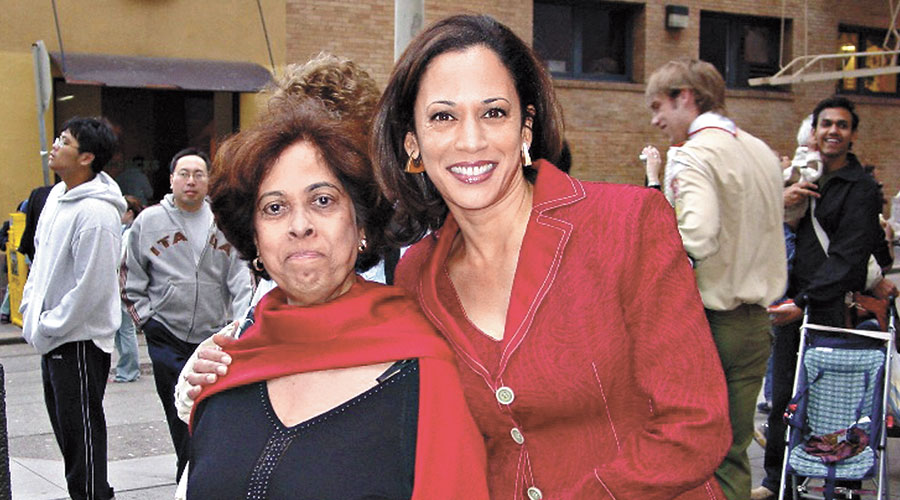Kamala Harris, an Indian-origin and African American senator, has been picked by Joe Biden, the presumptive Democratic candidate for the US presidential elections later this year, to be his running mate. The choice represents the land of opportunity America has always promised to be before that goal began looking like a chimera under the Donald Trump White House.
But Tuesday night’s development did not seem to sit easy with the Right wing in India, which did not display any of the effervescence that it reserves for those of Indian origin who do well elsewhere.
While it was only natural that nobody in the Narendra Modi government would comment on something so internal to American politics, bhakt land too remained quiet against the backdrop of Harris’s inclusive politics and reputation for taking up civil rights issues.
The lone exception was BJP national general secretary Ram Madhav, who appreciated a report on her being picked by Biden with an introductory tweet that said: “First Indian and Asian woman to get the nomination as official VP candidate.”
Madhav was promptly reminded by many that Harris identified herself more as “black” or African-American because of her Jamaican father.
Harris has explained this in her political memoir, The Truths We Hold: An American Journey: “My mother understood very well that she was raising two black daughters. She knew that her adopted homeland would see Maya and me as black girls and she was determined to make sure we would grow into confident, proud black women.”
Harris’s mother Shyamala Gopalan, a Tamil, was a breast-cancer scientist who had emigrated to the US to pursue a doctorate in nutrition and endocrinology at UC Berkeley.
Those who commented across social media platforms after Harris’s name was announced seemed essentially to be urging the Indian diaspora in the US not to be taken in by the India part of her origin. They highlighted that she had been against India’s actions in Kashmir and the new citizenship regime -- though there is no record of her actually speaking out against the latter.
On Kashmir, Harris, who had been a contender for the Democratic nomination for President before bowing out in support of Biden, is on record commenting not on the dilution of Article 370 but on the subsequent clampdown.
“We have to remind the Kashmiris that they are not alone in the world. We are all watching. There is a need to intervene if the situation demands,” she had been quoted as saying by the US media in September last year.
Harris was not the only Democratic contender for the presidential ticket to speak up for Kashmiris. Bernie Sanders and Elizabeth Warren, too, had raised the issue during their race for the nomination.
Later in December, Harris spoke up in support of Indian-American Congresswoman Pramila Jayapal, who has been critical of New Delhi’s Kashmir policy, after India insisted that she be dropped from a Congressional delegation that was to meet external affairs minister S. Jaishankar in Washington.
Reacting to the decision of the US lawmakers not to yield to the Indian demand to exclude Jayapal, Harris had tweeted: “It’s wrong for any foreign government to tell Congress what members are allowed in meetings on Capitol Hill. I stand with @RepJayapal and I’m glad her colleagues in the House did too.”
If the Right wing in the Indian diaspora was busy running Harris down, the liberals and those opposed to the Hinduvta advocates in the US came out in her support.
In a congratulatory message, Hindus for Human Rights said: “As beneficiaries of America’s welcome to immigrants and minorities, like your family, we stand ready to work with you to help reclaim America after the sad chapter of the last four years....
“Our organisation’s members are Hindus of conscience who take a firm stand against Hindu nationalism, both in India and in the US — which is as dangerous to Indian democracy as white nationalism is to American democracy.... So it is our earnest hope... you will also be actively engaged in reclaiming the traditional US-India relations.… As you are aware, all of these core values have been under great threat in both the largest democracies, under the pressure of the Trump-Modi camaraderie.”
The Global Indian Progressive Alliance (GIPA) too came out with a statement in support of Harris that said: “A loss of Biden-Harris will further empower Hindutva-laden saffron supremacists within the Indian American community, and we simply cannot afford that with the trend of a global shift to extreme Right-wing leaders.”
Asked how Harris’s choice as running mate would affect the Indian vote, which has traditionally been Democratic, Manish Madan, GIPA founder and professor of criminal justice at Stockton University, said the Hindutva-led saffron supremacist lobby would pressure the Biden-Harris campaign to mellow down its positions on the Citizenship Amendment Act, National Register of Citizens and the human rights of the people of Jammu and Kashmir.
“It is important for people to recognise that Biden-Harris have spoken up for the values that India as a country has long stood for (secular and pluralistic values) and, importantly, echo many progressive Indian American voices,” Madan said.
Biden’s agenda for Muslim Americans on his campaign website mentions both Kashmir and the CAA.
“In Kashmir, the Indian government should take all necessary steps to restore rights for all the people of Kashmir. Restrictions on dissent, such as preventing peaceful protests or shutting or slowing down the Internet, weaken democracy,” it says.
Further, it says that Biden has been disappointed by the measures the government of India has taken with the implementation of the NRC and its aftermath in Assam and the signing of the CAA into law.
“These measures are inconsistent with the country’s long tradition of secularism and with sustaining a multi-ethnic and multi-religious democracy,” the agenda says.











